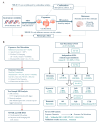Investigating Causal Associations between the Gut Microbiota and Dementia: A Mendelian Randomization Study
- PMID: 39408279
- PMCID: PMC11479048
- DOI: 10.3390/nu16193312
Investigating Causal Associations between the Gut Microbiota and Dementia: A Mendelian Randomization Study
Abstract
Background: The causal association of specific gut microbiota with dementia remains incompletely understood. We aimed to access the causal relationships in which one or more gut microbiota account for dementia. Method: Using data from the MiBioGen and FinnGen consortia, we employed multiple Mendelian randomization (MR) approaches including two-sample MR (TSMR), multivariable MR (MVMR), and Bayesian model averaging MR to comprehensively evaluate the causal associations between 119 genera and dementia, and to prioritize the predominant bacterium. Result: We identified 21 genera that had causal effects on dementia and suggested Barnesiella (OR = 0.827, 95%CI = 0.722-0.948, marginal inclusion probability [MIP] = 0.464; model-averaged causal estimate [MACE] = -0.068) and Allisonella (OR = 0.770, 95%CI = 0.693-0.855, MIP = 0.898, MACE = -0.204) as the predominant genera for AD and all-cause dementia. Conclusions: These findings confirm the causal relationships between specific gut microbiota and dementia, highlighting the necessity of multiple MR approaches in gut microbiota analysis, and provides promising genera as potential novel biomarkers for dementia risk.
Keywords: dementia; gut microbiota; mendelian randomization.
Conflict of interest statement
The authors declare no conflict of interest.
Figures



References
MeSH terms
Grants and funding
LinkOut - more resources
Full Text Sources
Medical

